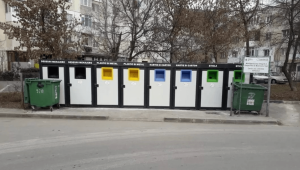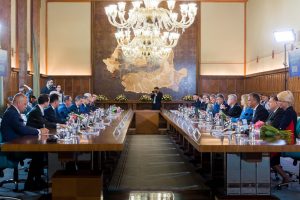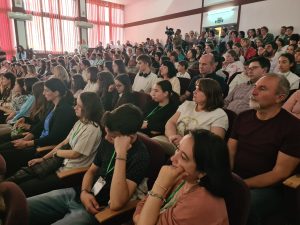
When we are trying to speak about death, each and every word is indecent. However, the prattle concerning Sahleanu’s death seems to be endless. Even if everything seems to be pretty clear, as the murderers and their accomplices have been arrested, and the prosecutors have established the components of the bill of indictment, there are plenty of big talkers who keep on speculating on this subject. The "exploitation" of a tragic event within a lucrative context is not a novelty in Romania. Gregarious petty politics and aggressive stupidity feel at ease here. The problem is that Sahleanu’s assassination questions the idea of privatization itself and the competition-specific economy promoted by the present government.
Whoever speaks about Tepro automatically resorts to one of the following cliches: miscarried privatization or fraudulent privatization . As a matter of fact, for a certain period of time, everybody thought that the assassination had been ordered by FPS (State Property Fund) officials and even today there are some persons who still believe that this institution had something to do with the Sahleanu case. Anyway, FPS is said to be the moral author of the assassination.
Personally, I should say that FPS officials have made many mistakes in general, but as far as the Sahleanu case is concerned, this institution couldn’t be reproached witth too many things, except a few bureaucratic details. It is very possible that FPS officials have made a bad choice as far as the Tepro privatization is concerned; in the same time, this privatization process is very likely to be a fraudulent one, i.e. a certain person or group might have gotten some money for having favoured the Czech company. But up to now nobody could prove any major mistake or fraud which could question the juridical act through which the Czech company has become Tepro’s main owner. Generally speaking, FPS is said to have made a bad choice as far as the buyer, the price and the post-privatization strategy are concerned. Many persons even pretend that Tepro employees had offered a more important amount of money; others just say that the Czech competitor has paid 3 billion dollars to those who could lead the Iasi company to bankruptcy and thus annihilate a dangerous competitor. All these suppositions do not rely on checked information. For the time being, all we know is that FPS had no viable alternative in the moment of privatization. The company was on its way to bankruptcy because its thousands of employees produced what other enterprises having just a few hundreds of employees couldo very well. FPS chose the most rational economic solution. Unlike the employees, the Czech company could redirect important sums of money to the country, without resorting to loans in order to get them. It also could offer a new perspective to the enterprise: reorganization and new investments. I really doubt that the employees’ representatives could have fired one thousand employees, as normal and healthy managerial principles would have required. The Czech businessmen could adapt Tepro to the conditions of a real economy. FPS officials couldn’t be held responsible for the trade-union conflicts that appeared at Tepro.
The Tepro case could be compared with a classical situation of conflict in which both combatants lose and are equally responsible. Everybody knows that the strikes were provoked by the reorganization plan. Sahleanu was probably a honest man; we should respect the fact he fought all his life in order to defend others, even if his means haven’t always been accepted. The problem is that the cause he fought for was a lost one.With or without a Czech manager, Tepro was forced to fire the personnel surplus. Nobody could find a different solution.
Virgil Sahleanu opposed this economic solution without resorting to any defensive means. It was a tragical choice, which led to the enterprise’s destruction. His death didn’t attenuate the illusion of a trade-union policy based on the force of the many and the refusal of obvious things. Sahleanu’s violent assassination has been transformed into an event founding a new trade-union mythology: an anarchical trade-unionism which has a violent and totalitarian character, resembling Miron Cozma’s policy. This trade-unionism refuses to accept the fact that any enterprise represents a profitable business and not an asylum. It is a trade-unionism hindering the country’s development. The fact that the number of investments is progressively diminishing anticipates a general state of pauperization. At the same type, this kind of trade-unionism represents the echo of an immature public life, dominated by violence, powerful totalitarian atavisms and a deficient managerial behaviour. The Tepro crisis exceeded the Czech investor’s competence to solve difficult situations. By resorting to compromised and dull persons, the Czechs treated the Tepro employees like some flies they could get rid of within a few hours.
Actually, the fundamental condition of a healthy economic development seems to depend on the partnership between employees and employers. But this also requires a trade-unionism able to defend the employees’ rights from a legal and rational perspective, without getting too involved into politics. The quantity principle shouldn’t be confounded with the economic truth and employers should always consider employees as normal human beings able to co-operate with them. Without knowing it, Sahleanu fought for such rights, which reject the comparison between an enterprise and a concentration camp.
(Florea IONCIOAIA)






















